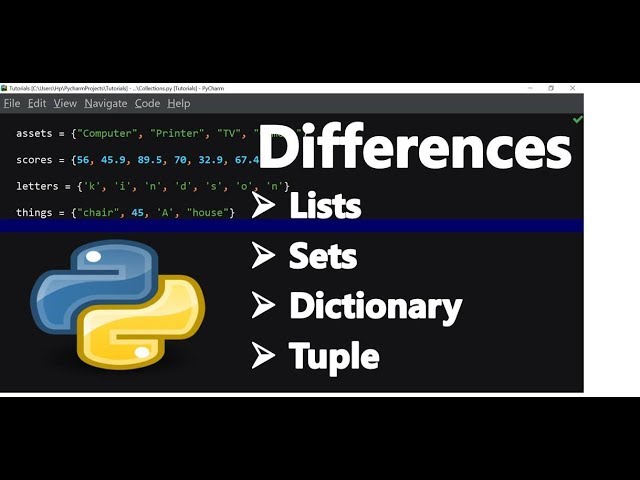Tuple, Set, and Dictionary
Posted 2024-07-16 21:35:59
0
8K

These are all fundamental data structures used to organize information in programming. Here's a breakdown of each:
Tuple:
- Ordered collection of elements, similar to a list.
- Elements can be of different data types (strings, numbers, etc.).
- Immutable: Once created, you cannot change the elements within the tuple.
- Used for representing fixed data like coordinates (x, y) or product details (name, price, stock).
Set:
- Unordered collection of unique elements.
- Elements can be various data types.
- Useful for storing unique items and performing set operations like checking membership or finding differences between sets.
Dictionary:
- Unordered collection of key-value pairs.
- Keys must be unique and immutable (often strings or numbers).
- Values can be any data type.
- Used for storing data where you need to access it by a specific key, like phone numbers in a phonebook (key: name, value: phone number).
Here's a table summarizing the key differences:
| Feature | Tuple | Set | Dictionary |
|---|---|---|---|
| Order | Ordered | Unordered | Unordered |
| Mutability | Immutable | Mutable | Mutable |
| Duplicate Data | Allowed | Not Allowed | Not Allowed (for Keys) |
| Access Method | By index | By membership | By key |
Search
Categories
- Technology
- Education
- Business
- Music
- Got talent
- Film
- Politics
- Food
- Games
- Gardening
- Health
- Home
- Literature
- Networking
- Other
- Party
- Religion
- Shopping
- Sports
- Theater
- Wellness
Read More
S.4 BIOLOGY SCENARIO BASED QUESTIONS
S.4 BIOLOGY SCENARIO BASED QUESTIONS
Know Your Worth, Control Your Emotions, and Never Settle
In a world that often pushes us to conform, understanding your value, mastering your emotions,...
S.4 SOLUTIONS TO THE PHYSICS SEMINAR QUESTIONS
S.4 SOLUTIONS TO THE PHYSICS SEMINAR QUESTIONS
Choosing Kindness in the Face of Anger: A Path to Transformation
Imagine standing at the crossroads of an emotional storm. Someone’s words or actions have...
Versions of the Linux Operating System
Linux is a versatile and open-source operating system kernel that serves as the foundation for a...



